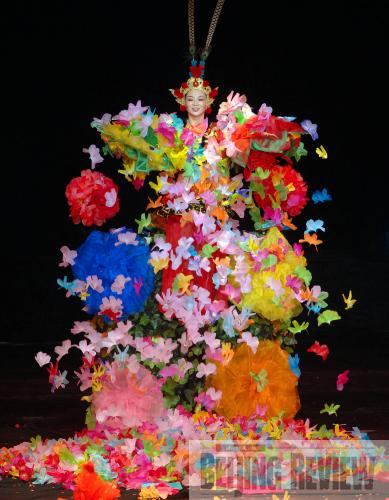|
 |
|
SOURCE OF INSPIRATION: China's magicians impress the appraisal committee and professional audience by creatively integrating Chinese elements into their performances during the World Championships of Magic Beijing 2009 (GONG LEI) |
On the heels of a nationwide fever to learn the art of magic, world-class magic shows, forums and exhibitions during the 24th World Championships of Magic Beijing 2009 provided a real eye-opener for the country's growing community of amateur magicians.
The championships, the biggest event of the International Federation of Magic Societies (FISM), were held for the first time here, from July 26 to 31. Unfortunately, the general public was not allowed to view the competitions, but they did have a chance to see the stunning performances of the best magicians in a series of shows, called the Supreme Magic Show, at the Beijing Exhibition Center Theater after the competitions ended.
Nine magic masters around the world showed off the silky skills to the public on a hi-tech, well-lit stage during the Supreme Magic Show from August 1 to 8. While Beijing magic fans were left gobsmacked by the awesome performances and imaginative stage props, analysts are pondering over the gap between Chinese magicians and their world-class counterparts.
The competition
Called the "Magic Olympics," the World Championships of Magic is held every three years by the FISM. The federation was founded in 1948 and now represents about 60,000 magicians in 40 countries and regions.
The event this year attracted more than 2,500 magicians, audiences, and magic props dealers from 66 countries and regions. It offered 100 stage and close-up magic performances during four stage competitions and three close-up competitions. Meanwhile, 10 world renowned magicians gave 14 lectures, and more than 70 magic props exhibitors and retailers from 24 countries brought with them novelty props, books and DVD products for exhibition. More highlights of the event included guest performances, magic salons, a course given by American master close-up performer Jeff McBride, and a solo magic show by American magician Lou Hilario.
The stage competition was divided into five categories: general magic, manipulation, mental magic, stage illusions and comedy magic, and the close-up competition into three: card magic, parlor magic and micro magic. Canadian magician Shawn Farquhar and Hungarian magician Soma won the gold medals, respectively for the close-up and stage competitions. Two out of the 11 Chinese magicians won prizes. Sixteen-year-old Ma Yanyan, the youngest competitor, won the second prize for general magic with her Danseuse's Card Magic, and the trio of the Magic Sky Group won the second prize for stage illusions with their Charm of Blue and White Porcelain. This is the best championship result achieved by China for years.
"I won the prize because we innovatively combined ballet movements with magic performance, and it's novelty for most of the audience," Ma said.
The Beijing-based Magic Sky Group also had a couple of innovations in techniques and art forms for their performances, of which a technical breakthrough in a magic box allowed performers inside to change six times in one minute and a half. This outstanding feat impressed the professional audience, said Lin Jian, Secretary General of the championship's organization committee.
"The performance was full of Chinese characteristics, from stage design, costume, to props, music selection and dancing, " Lin said. "The design and making of fine props cost more than 150,000 yuan ($21,962) for the 10-minute performance."
China's magicians don't have to imitate their Western peers and it will be a nice solution if they draw inspiration from China's traditional culture and hence develop something new and creative, said FISM's President Eric Eswin.
Defining a role
As a highlight, nine magicians who performed in the competitions offered the Beijing audience an audio-visual sensory overload, the Supreme Magic Show.
All of them have won gold medals in various magic competitions worldwide. Integrating spectacular stage lightings, multimedia methods with unimaginable creativeness, "Supreme Magic" as the retained FISM program, has been a legendary success for global audiences.
According to German performer Topas, who performed for the Supreme Magic Show, there are three types of magicians, the killer, the victim and the witness. The magician can create the magic, be a victim of the magic or be a witness to the magic in terms of their characters and presentation style.
| 